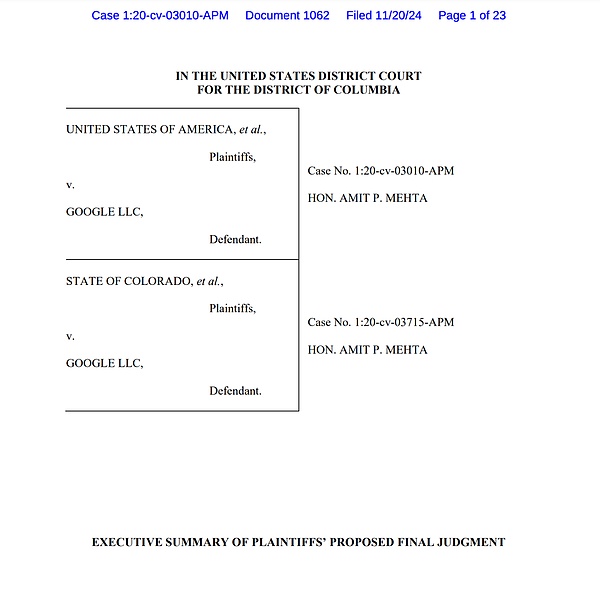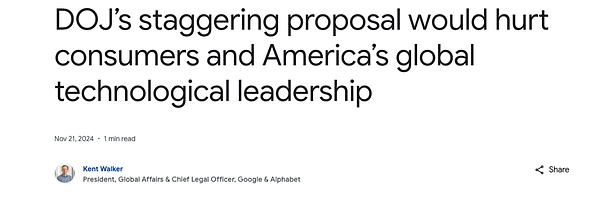Source: Newin
The U.S. Department of Justice (DOJ) asked a federal judge to force Google to sell its Chrome browser and possibly Android operating system on Wednesday evening to eliminate Google's illegal search monopoly.
The U.S. District Court for the District of Columbia made a historic ruling against Google's antitrust lawsuit, finding that its monopoly in the general search service and search advertising markets violated the Sherman Act.
The court pointed out that Google illegally maintained its market dominance through a series of exclusive agreements and technical control measures, which brought systematic obstacles to competitors. This ruling may reshape the competitive landscape of the digital economy and set a precedent for the regulation of global technology giants.
During this period, OpenAI is stepping up its efforts to seize Google's browser and search engine share. In addition to currently guiding ChatGPT users to replace Google's native search engine in the browser, it is considering developing a web browser NLWeb (Natural Language Web) that combines ChatGPT functions
It is reported that OpenAI has discussed or reached agreements with multiple industry websites and applications to provide them with AI-driven search functions. These potential moves show that OpenAI is gradually entering Google's core areas, including browsers and search engines.
Ruling Summary: Google's core behavior of "illegal monopoly"
The materials submitted by the US Department of Justice stated that Google has continuously strengthened its market monopoly position in search services through its dominant position in the Chrome browser and Android operating system.

The ruling specifically mentions the following exclusive behaviors:
Google has long signed exclusive agreements with device manufacturers and distributors to ensure that its search engine becomes the default option and prevent competitors from obtaining key distribution channels.
Using its large-scale user data advantage to hinder other search engines from gaining competitiveness through technological innovation.
Directly eliminating competitive threats through huge profit-sharing payment agreements (such as the search engine setting agreement reached with Apple).
Controlling the advertising technology ecosystem, it is almost impossible for advertisers to choose other platforms under high costs and low transparency.
The court believes that Google's behavior has led to a "market closed effect", competitors are excluded because they cannot obtain sufficient scale effects, and market investment and innovation are also suppressed.
The ruling states: "Google has deprived consumers and advertisers of their actual right to choose through its exclusive distribution agreements and closed technology policies, and has long distorted market competition in the digital economy."
Rectification plan proposed for the plaintiff: structural splitting and behavioral supervision in parallel
In order to restore market competition, the plaintiffs (including the U.S. Department of Justice and more than 30 state governments) proposed a comprehensive rectification plan covering ten years. The plan aims to "thaw" the monopoly ecology that Google has built for a long time through structural adjustments and behavioral restrictions. The main contents are as follows:
1) Split core assets: divest Chrome and possible Android systems
Google needs to completely divest its Chrome browser business, which has a market share of more than 60%. The plaintiff believes that this browser is a key tool for Google to strengthen its dominant position in the search engine market.
Regarding the Android operating system, the rectification plan proposes two options:
Complete divestiture: Google needs to sell the Android system to an independent third party to prevent it from continuing to exclusively promote Google Search using the system default settings.
Behavioral supervision: If Google retains ownership of Android, it needs to conduct long-term supervision of its search engine distribution strategy, including opening up setting options and prohibiting default search engine binding.
2) Data transparency and sharing
Google needs to open its search index data to competitors and provide advertising-related data and user behavior data to competitors for free within 10 years to help competitors narrow the technological gap caused by the "scale effect".
The platform needs to open data crawling permissions to content publishers and allow publishers to choose whether to agree that their content is used for artificial intelligence training.
3) Prohibition of exclusive agreements and profit-sharing models
Google shall no longer sign any exclusive agreements with device manufacturers, browser developers or content publishing platforms, including paying huge profits to obtain the status of default search engines.
Stop paying profits to partners such as Apple to avoid further concentration in the search market.
4) User choice and education
All devices must display a fair search engine selection interface to users to avoid unfair exclusion of other competitors by default Google search settings.
Google must fund a nationwide user education program to help consumers understand the advantages and disadvantages of different search engines, and may encourage users to choose non-Google search engines through short-term incentives.
5) Advertisement market transparency
Google needs to provide advertisers with more comprehensive bidding and performance data in real time, improve the transparency of advertising services, and allow advertisers to freely migrate advertising data to other platforms.
Google: Excessive intervention will have devastating consequences
In a statement, Kent Walker, president of Google's global affairs, said that the remedies proposed by the US Department of Justice are "a radical interventionist agenda that will harm Americans and the United States' global technological leadership."

Google said that the forced stripping of Chrome and Android systems will weaken the security and privacy protection capabilities of these products. Google emphasized that millions of users rely on the high-quality experience and strict privacy protection measures of these products.
Google criticized the Department of Justice's proposal for its potential to deal a serious blow to the field of artificial intelligence. Artificial intelligence is regarded as "the most important technological innovation of our time", and Google is worried that excessive regulation will weaken its global dominance in this field, thereby affecting the technological competitiveness of the United States.
Google specifically mentioned that innovative products such as Mozilla's Firefox browser rely on the search share paid by Google for their survival. The proposal of the Ministry of Justice may threaten this ecosystem, which in turn affects consumers' choices and usage experience.
Google quoted the court's judgment and emphasized that its search engine is "the highest quality service in the industry" and has won the trust of hundreds of millions of users.
In addition, Google believes that the rectification proposal of the Ministry of Justice deviates from the original intention of the court, goes beyond the scope of the ruling, and obviously attempts to promote a broader regulatory agenda.
Google said it will submit its own rectification proposal next month, focusing on more reasonable and more consistent solutions with the ruling, and plans to further clarify its position in early 2025.
OpenAI's Critical Time Window
OpenAI is developing a product called NLWeb (Natural Language Web) that uses natural language processing technology to provide a conversational search experience for websites and applications.
Users can interact with websites directly through chat, such as searching for a certain listing on the real estate website Redfin, or looking for recipes for a specific dish on the cooking website Bon Appétit.
OpenAI has discussed this technology with many companies, including Condé Nast, Redfin, Eventbrite and Priceline. It is said that this conversational search tool will help companies significantly improve the user experience. For example, a user can ask a retail website for a jacket suitable for winter travel, and the system will directly display relevant product images and recommended links.
This search experience not only provides convenience for users, but also helps websites optimize search results, while improving the accuracy of ChatGPT's responses in specific areas (such as real estate and retail).
In addition to search functions, OpenAI is also considering developing a new AI-driven browser. According to people familiar with the matter, OpenAI hired two key engineers who had participated in the development of Google Chrome earlier this year, including Ben Goodger, a founding member of the Chrome team. This shows that OpenAI is seriously exploring this direction.
The browser may become the next key platform for OpenAI to expand its ecosystem. By building a browser that incorporates ChatGPT capabilities, OpenAI can have more control over how users access network resources. Similar to Google's strategy when it launched Chrome in 2008, this will help OpenAI build its own "moat" in the highly competitive browser market.
OpenAI is also reportedly discussing with Samsung the possibility of integrating AI technology into its devices. Samsung is currently a key partner of Google, using Google's Android system to power its phones and integrating Google's Gemini AI capabilities. OpenAI has recently reached a cooperation agreement with Apple to provide it with AI-driven features.
For Samsung, working with OpenAI may be a negotiation strategy to ensure that it has more options in its cooperation with Google. It is not clear whether Samsung will adopt OpenAI's technology, but it undoubtedly poses a potential threat to Google.
Brave Software CEO Brendan Eich said that OpenAI's current strategy is similar to the idea when Google launched Chrome and Android. By mastering the main entrance of how users access the Internet, OpenAI can strengthen its technology ecosystem and fight against competition.
 JinseFinance
JinseFinance
 JinseFinance
JinseFinance TheBlock
TheBlock Bitcoinist
Bitcoinist Catherine
Catherine Beincrypto
Beincrypto Cointelegraph
Cointelegraph Cointelegraph
Cointelegraph Nell
Nell Bitcoinist
Bitcoinist Ftftx
Ftftx